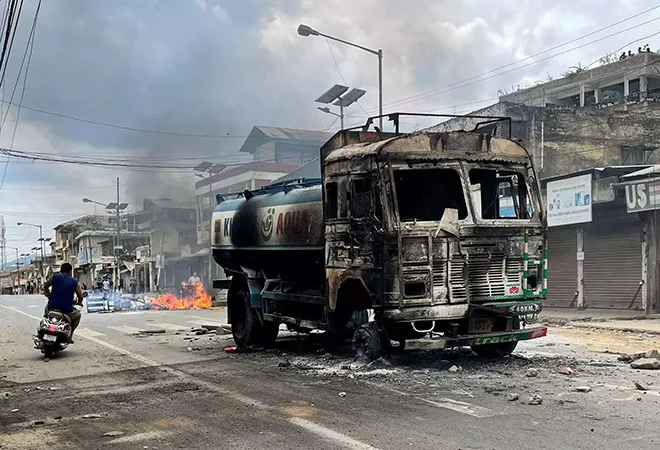-
CENTRES
Progammes & Centres
Location
The festering age-old ethnic divide amongst the tribes in Manipur has led to the ongoing crisis. All key stakeholders need to be active to ensure this comes to an end.

The violent incidents that recently erupted in Manipur, forcing the state government to impose a curfew in eight districts, suspend internet services, and the Central government to deploy the paramilitary forces and the army to restore law and order, were not wholly unexpected. In terms of de-escalation of decades-long violence by the militant groups, the hard-earned peace looks to be under threat with the unfolding of the recent episodes of violence in Manipur. Based on the deep-rooted ethnic divide (read especially between the majority valley-based Meiteis and the hill-based Kuki minorities), the eruption of violent clashes throws vital signs of an inevitable civil war-like situation unless the everyday politics of fear, anxiety, insecurity, and the mutual distrust among the ethnic groups are identified and addressed with immediate effect.
Going by the statement of the Chief Minister of Manipur, Biren Singh, the episodes of violence have claimed more than 60 lives, injured 200 people, displaced 35,000 people, and burnt down 1,700 houses so far. While the reports reflect upon the triggering points (miscreants vandalising the venue of the Chief Minister's programme at Churachandpur on 28 April, followed by the burning down of the Anglo-Kuki War centenary Gate on 3 May, and the ‘Tribal Solidarity March’ led by the All Tribal Students Union of Manipur (ATSUM) on the same day) that led to the outbreak of the violent episodes, there is a need to analyse the larger spectrum of ethnic conflict in Manipur. This article reflects on the issues around which the deep-rooted ethnic conflicts are perceived, pursued, and sustained in Manipur.
Assertive identities and contesting indigeneity
Arguably, a fundamental factor contributing to most of the conflicts in Manipur is the deep-rooted ethnic divide among the Meiteis, Nagas, and Kukis. Over the years, the assertion of ethnic identities continues to shape the social, political, and economic relationships (read conflictual) among these groups. The source of such conflictual interactions among ethnic groups can be attributed to the competing and contesting ideas of indigeneity. The divergent imagination of ‘a home land’ often strengthens and sustains the ethnic divide among these groups. Moreover, ethnic assertion coupled with majoritarian demands by the individual groups also contributes to the ethnic faultline.
Over the years, the assertion of ethnic identities continues to shape the social, political, and economic relationships (read conflictual) among these groups.
Accordingly, the idea of ‘Manipur’ varies from one group to the other. Most Meiteis, concentrated mainly in and around Imphal Valley, often see themselves as the custodian and the protector of Manipuri integrity. The indigeneity of the minority tribal communities, especially the Kukis, is often questioned and rejected. While the Meiteis are often alleged to subscribe to majoritarianism, irrespective of the political party in power, the intense demands by the Kukis and the Nagas were also viewed as a threat to the territorial integrity of Manipur by the Meiteis. It is essential to mention that the Nagas' subscription to Nagalim would take away some portions of Manipur. Similarly, the imagination of a Kuki land-Zale’n-gam also removes some parts of the present Manipur state. In such a scenario of contested indigeneity coupled with divergent and competing narratives of territoriality, the ethnic conflicts among these groups only get consolidated.
The fear of NRC
One of the recent issues that advance the ethnic divide in Manipur is the demand for introducing the National Register for Citizens (NRC) in Manipur. This demand is mainly led by various Meitei organisations supported by the Manipuri Nagas. The demand for the NRC grew with the N Biren Singh government retaining power in the 2022 state assembly election. Massive rallies were organised in March this year by the Meitei and Naga organisations demanding the immediate introduction of NRC. The demand for the NRC can be reasoned against an alleged rise in the population of ‘illegal immigrants’ in Manipur. Talking of the ‘illegal immigrants,’ one can easily make out that the demand for the NRC is mostly on the suspicion that the Kukis are providing the Chins from neighbouring Myanmar safe passage and settlement in the Kuki-inhabited hills of Manipur. Such a narrative alleging the role of the Kukis in the rise of the ‘illegal immigrant’ population allows the Meiteis and the Nagas to share a common ground. Accordingly, the opportunist alliance between the Meiteis and the Nagas hold the Kukis responsible for posing a threat to Manipur by changing the state's demography. Moreover, the Kukis are also alleged to be involved in illegal poppy cultivation and drug business that seriously threaten the state.
It is essential to mention that the Nagas' subscription to Nagalim would take away some portions of Manipur.
As the Kukis are seen as foreigners and outsiders, the escalated demands for the NRC add to the apprehensions of the former. However, with the military Junta taking over power in Myanmar in 2021, the influx of the Chin-Zomi-Kuki-Mizo tribes to Manipur cannot be ruled out. Nevertheless, whether the influx of Chins from Myanmar has outnumbered the local population in Manipur, as alleged by the Nagas and the Meiteis, needs a thorough investigation. As the demands for NRC are gaining momentum, the responses of the state government add to the fear and anxiety of the Kukis and advance the ethnic strife in Manipur.
Responding to the NRC demand, Biren Singh in March 2023 announced that the Manipur State Population Commission (MSPC) will identify the illegal immigrants based on a house-to-house survey. What added to the mistrust among Kukis was the state government’s aggressive drive against poppy cultivation in the hills of Manipur. Several households belonging to the Kukis have faced eviction as the state government declared the land as protected/reserved forest areas. What accentuated the conflicts was the demolition of the tribal colony and a church belonging to the Kukis in the wee hours on 11 April 2023.
The Kukis are also alleged to be involved in illegal poppy cultivation and drug business that seriously threaten the state.
The state government’s demolition and eviction drives, the process of ‘othering’ by terming the Kukis as outsiders and foreigners, alleging the Kukis were responsible for the poppy cultivation and influx of ‘illegal migrants from Myanmar, and the Meitei community’s demand for the tribal status wrapped with the old wounds of ethnic strife have directly contributed to the revival of violent incidents in restive Manipur.
Conclusion
With active Central intervention, the violent incidents appear to have subsided for now. However, given the fragile nature of relationships among the warring ethnic groups, one has to be very cautious before drawing any conclusion on the situation in Manipur. The reluctance of warring ethnic groups to have constructive dialogues regarding the equitable distribution of resources greatly enhances the risk of violent conflicts in future.
Given the fragile nature of relationships among the warring ethnic groups, one has to be very cautious before drawing any conclusion on the situation in Manipur.
Further, the ongoing conflicts in Myanmar will continue to have some spill-over effects on Manipur. Migration from Myanmar poses a serious challenge to maintaining ethnic peace in Manipur. The conflict between the political rigidity of the modern state boundaries and the flexibility of the social and fraternal ties between the tribal communities across the borders also hurts the ethnic relations in Manipur. As the State government’s responses to the demands and grievances of the ethnic communities seem to be governed by majoritarian sentiments, the restoration of peace among conflicting groups is going to be a major challenge. A much-suggested dialogue among the ethnic groups would serve very little unless the current dispensation in Manipur shows fairness and neutrality in dealing with ethnic groups and diverse communities. Thus, an enduring peace in Manipur requires a lot of hard work from all the key stakeholders.
Anshuman Behera is an Associate Professor in the Conflict Resolution and Peace Research Programme at the National Institute of Advanced Studies (NIAS), Bengaluru.
The views expressed above belong to the author(s). ORF research and analyses now available on Telegram! Click here to access our curated content — blogs, longforms and interviews.

Dr. Anshuman Behera is an Associate Professor in the Conflict Resolution and Peace Research Programme at the National Institute of Advanced Studies (NIAS) Bengaluru. Dr. ...
Read More +